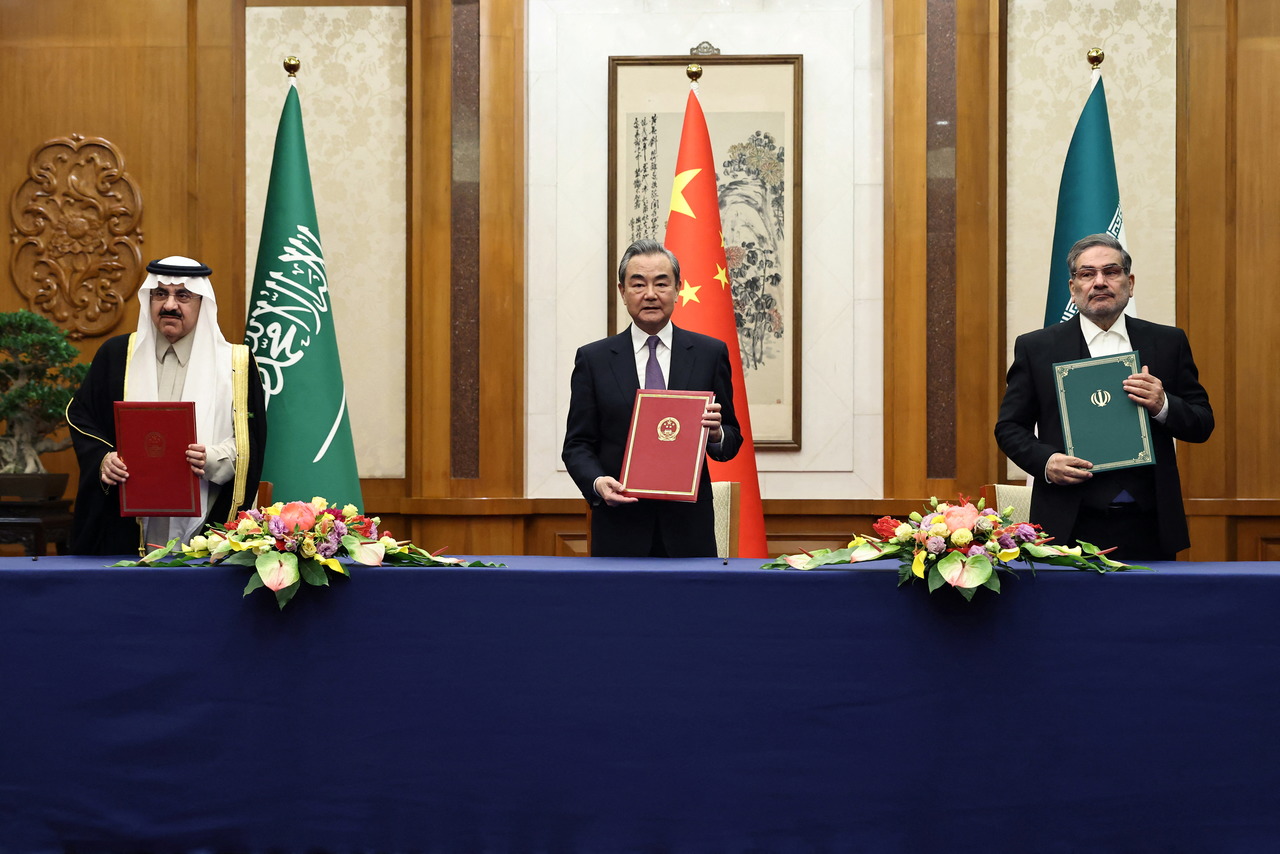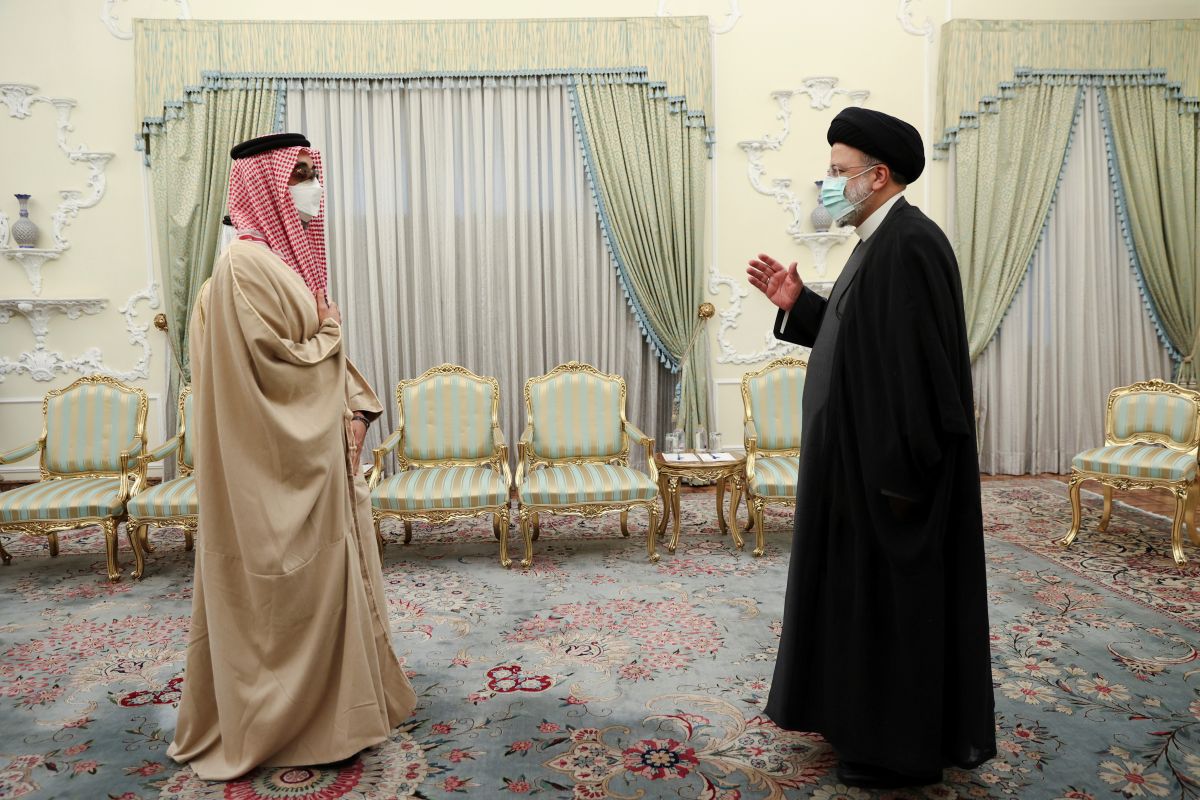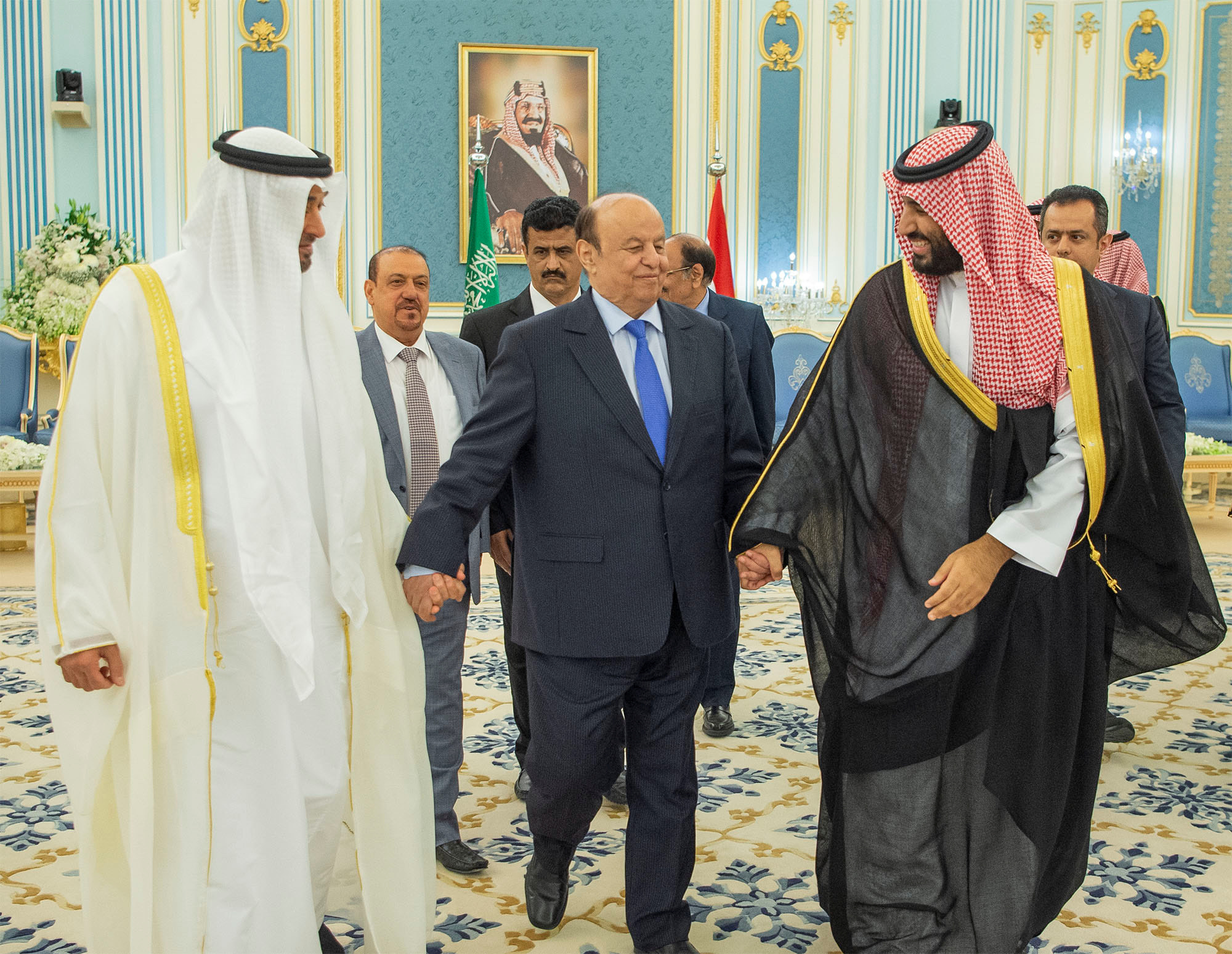Saudi Arabia's Agreement with Iran Signals Policy Shift
The main motivation for the Saudi authorities to reach an agreement with Iran was the desire to reduce tensions in the Persian Gulf to facilitate the diversification and strengthening of the Saudi economy. China’s involvement in the talks is a further sign of the deteriorating relations between Saudi Arabia and the U.S. The monarchy will use its relations with China to strengthen its position in international relations and to discourage the West from criticising its policies.
 CHINA DAILY / Reuters / Forum
CHINA DAILY / Reuters / Forum
Saudi Motivations
On 6 April, Saudi Arabia and Iran agreed to reopen their embassies and resume official visits in accordance with the agreement signed on 10 March in Beijing normalising their relations, which includes the revival of security cooperation agreements from 2001. There had been no official relationship between the two countries since 2016 when demonstrators attacked the Saudi embassy and consulate in Iran in response to the execution of Shiite cleric Nimr al-Nimr in the kingdom.
The pursuit of an agreement with Iran resulted from the Saudi authorities’ conviction that they could no longer rely on the U.S. as a guarantor of their security. This was influenced by the U.S. authorities’ mild reaction to the attacks on Saudi mining infrastructure in 2019 and the progressive deterioration of relations with the U.S. since Joe Biden became president. This coincided with Crown Prince Muhammad bin Salman’s (MBS) drive to make the Saudi economy independent of oil exports and attract multi-billion foreign investments to the country as part of his “Vision 2030” strategy. It requires stability in the Persian Gulf, and one of the main obstacles to achieving it remains the Saudi-Iranian rivalry. For this reason, talks have been held between the states in Iraq since 2021. However, the lack of agreement concerning Iran’s support for the Houthi Shiite militias and Saudi Arabia’s backing of the government in Yemen, which is fighting the militias, prevented normalisation. Ultimately, the perception of China as able to influence Iran’s policy due to its key role in its economy led Saudi Arabia to accept the normalisation agreement with China as its guarantor.
Regional Context
The Beijing agreement is to focus primarily on stabilising the Persian Gulf and the wider Middle East (although details remain secret). On 13 April, Syrian Foreign Minister Faisal Mekdad visited Riyadh accompanied by a delegation from Iran, which indicated that the normalisation of relations between Saudi Arabia and Syria and the monarchy’s willingness to restore Syria’s membership in the Arab League was part of the agreement with Iran. A delegation from Saudi Arabia also held talks on 9 April with representatives of the Houthis, the aim of which was to work towards an agreement that would lay the foundations for a further peace process in Yemen. Talks with the Houthis and normalisation with Iran signal the Saudi authorities’ unwillingness to maintain support for the Yemeni government, resulting from its progressive fragmentation and inefficiency in managing the controlled provinces. However, internal conflicts, fuelled only by the Saudi-Iranian rivalry, remain the basis of the war.
The agreement is also part of the monarchy’s increasingly transactional approach to relations with the countries of the region. This was emphasised by the declaration of the Saudi Finance Minister Muhammad al-Jadan of 15 March about future investments in Iran if the terms of the agreement are respected. The Saudi authorities, despite a trust deficit, assume that Iran will refrain from actions that could jeopardise normalisation. They base this assessment on a juxtaposition of the needs of a crisis-ridden Iran with Saudi investment opportunities— Saudi oil company Aramco reported record oil profits of $161 billion in 2022. The agreement will also facilitate regional economic cooperation, which is another investment opportunity from the Saudi perspective. At the same time, breaking Iran’s isolation postpones the chances for normalisation between Saudi Arabia and Israel, which was supposed to be part of American efforts to create a Middle East defence alliance to counter Iran’s destabilising influence.
Saudi Arabia and the “Multipolar World”
China’s involvement in the Saudi-Iranian talks is in line with growing interest in Saudi Arabia in the concept of a “multipolar world order”, popularised by China, among others. From the perspective of the Saudi authorities, the sanctions imposed on Russia have enabled them to increase their control over the global oil market, which they are using to consolidate their position in relations with Western countries. The Saudis’ goal is to discourage the West from forcing the kingdom into decisions that are favourable to other countries (e.g., Ukraine) or with respect to human rights by suspending the sale of arms (e.g., as did Sweden and the U.S. under Biden in connection with Saudi Arabia’s involvement in Yemen). Among the actions in this regard were the decisions by OPEC+, a conglomerate led by Saudi Arabia, to successively reduce oil production in October 2022 and at the end of March, despite visits by Western leaders asking for increased production. These decisions kept oil prices high and allowed Russia to obtain key budget revenues to continue its military operations. In addition, although the U.S. authorities reacted positively to the normalisation agreement, its signing at a time of intensified criticism of Iran by Western states due to it supplying Russia with drones (also built in part by Chinese companies) used in attacks in Ukraine remains problematic for the West’s relations with Saudi Arabia.
The monarchy’s belief in the need to undermine the West’s global influence is also evidenced by its interest in international organisations created in opposition to Western influences and spread of democracy. On 29 March, the Saudi government approved a memorandum granting the state the status of a dialogue partner in the Shanghai Cooperation Organisation, which includes China and Russia. Also, representatives of the Saudi monarchy have repeatedly expressed their will to join BRICS (another format to which Russia and China also belong).
For Saudi Arabia, relations with China—its largest trading partner—are also crucial for the success of the economic transformation strategy. Western sanctions have resulted in China buying more Russian oil and in 2023, Russia became the country’s largest oil supplier (in 2021 and 2022, it was Saudi Arabia). Strengthening political relations is therefore also intended to emphasise the benefits of economic cooperation with the monarchy, as indicated by two agreements between Aramco and Chinese oil companies signed after the Saudis’ normalisation with Iran.
Conclusions and Perspectives
China’s involvement in the talks with Iran is another signal of Saudi Arabia’s re-evaluation of foreign policy based on a strong partnership with the U.S. and Western countries. The increasingly closer relations with China also result from the belief that a greater role of the Chinese in the Middle East, so far dominated by a West conditioning some of its policies on democratic values, will help the monarchy strengthen its global position.
Although the agreement should be perceived as an opportunity to improve the situation in the Middle East, it alone will not be able to guarantee lasting peace. A definitive solution to the war in Yemen requires a separate agreement between the many factions that make up the three main fronts. The continuation of internal conflicts in Iraq and Lebanon also means that the pro-Iranian militias present there will continue to pose a threat to Saudi Arabia and the oil trade. Further attacks by them on Saudi territory would be a challenge to China’s credibility as a guarantor of the agreement with Iran. Moreover, the progressing normalisation of relations between Arab states and the Russian-backed Assad regime in Syria will strengthen Russian influence in the Middle East and limit the effectiveness of Western sanctions.
With the amount of oil imported into Europe from monarchies only increasing, greater involvement of EU countries in the security of trade routes in the Persian Gulf may be necessary to guarantee the stability of supplies. This would counterbalance China’s growing involvement due to its limited security potential. Stability in the subregion and limiting the growing anti-Western sentiments among the Saudi authorities is also in Poland’s interest due to the 2022 agreement allowing Saudi Aramco to take over 30% of the shares of Gdańsk Refinery.
While continuing the diversification of sources of oil supplies, EU countries should take into account MBS's actions aimed at consolidating Saudi position via opposition to the “hegemony of the west”, which in effect contradicts the objectives related to the defence of Ukraine. In talks with the Saudi authorities, EU countries should put more emphasis on the threats that Russia’s actions pose to Saudi interests, such as the sale of Su-35 fighter jets to Iran or the intensification of competition between Russia and Saudi Arabia as exporters of oil to China.




_sm.jpg)
